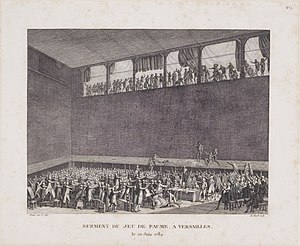 Image via Wikipedia
Image via Wikipedia
Mine is a civil matter, but were it to be a criminal affair, then the facts would be investigated by a 'juge d'instruction', once the appropriate 'procureur' has decided that a case might be worth investigating. The former is a magistrate, independent of government, whose activities are controlled by a national commission composed of other magistrates who will understand. The procureur, a magistrate of the Parquet, is the public prosecutor, who answers to the Ministry of Justice - thus to the government.
Now to someone brought up in a Common Law environment...England, the Commonwealth, the U.S....the idea of an investigating magistrate is strange. All the state has to do is prepare its' case and let the defendent prepare his, then let the court decide, but in France the court is held to need guidance, so the investigating magistrate gets to work, sending out police and gendarmes to collect evidence which is assembled into a report which generally decides that the prosecutor was right to prosecute and that the court will be right to proceed to judgement. You get the same idea with the European Court of Justice - modelled on France as is so much of EU administrative practice - where the Avocat General's report is generally followed by the court. So often that lawyers start to consult his reports without even waiting for the actual rubber stamp decision to emerge.
Down here, where not much troubles the still waters, the investigating magistrates are usually young things sent down to 'la France profonde' to learn about incest, or total no hopers and weirdos that have to be parked somewhere unobtrusive as there is no chance of the national commission allowing them to be sacked. They're independent, after all. Nomatter into which category they fall, they are generally hopeless at investigation as one would understand it coming from a Common Law system and there is no incentive in the system to make them improve. They have absolutely no idea of proportionality - in a case of alleged defamation a journalist found himself being repeatedly searched. It didn't go down too well in his newspaper, but I tend to think he was not an isolated case, just that most people don't have a newspaper to publicise their woes.
A few years' ago there was public outrage at the conduct of the investigating magistrate in the Outreau case, where allegations of child abuse led to a whole community being dragged through the courts and into prison because an inexperienced investigative magistrate lost his head and started believing in his own omnipotence. He had thirteen people jugged in preventive detention, all of whom were found to be innocent. What action did the national commission which oversees investigating magistrates take? They reprimanded him. The case highlighted the weaknesses of the sytem, where, although relatively inexperienced, he had no back up or effective supervision and there were calls for urgent reform. Well, urgent in the legal sense....the committee appointed to investigate is reporting to Sarkozy next week and it looks as though they will propose to abolish the investigating magistrate, independant of all effective control, and leave all decisions as to whether or not to prosecute with the procureur, the Ministry of Justice's man.
I did a double take when I saw that they also proposed to reinforce the neutrality of the President, the presiding judge in the group of three who hear criminal cases. What did they mean..reinforce the neutrality....they were admitting he wasn't, or what? Then it occurred to me that we are in France...we are thinking French. All it means is that it is proposed that in future, rather than participating in the decisions of his colleagues, he will only have a casting vote. So that's all right then.
Needless to say, investigating magistrates are not wonderfully happy, even if it is proposed to give them a new role overseeing the investigations to see that they are properly carried out - pause for boggling mind to return to equilibrium - and to supervise requests for 'phone tapping, etc. Considering what they are capable of doing currently, it doesn't seem much of a guarantee of public liberty to me.
However, I don't think Sarkozy is too worried about unjust accusations and incompetent casework. I think he is worried about the role of the investigating magistrate in high profile affairs involving politics and high level business. An independent magistrate can undertake investigations into the financing of political parties, can enquire into the strange Spanish practices of the mairie of Paris when Chirac was in charge and can handcuff the head of Elf, the petroleum company, when investigating international corruption. He can make public any amount of dirty work behind the screens, as in the case of the submarines sold to Pakistan and the bombing of the workers' coach. He is independent, and, once launched, there is little the government can do to deflect him.
The procureur, however, is not independent, by the very nature of his appointment, and the European Court of Human Rights has declared that the Parquet, wherein he lives, works and has his being, can not be regarded as an independent judicial authority. While currently Sarkozy's old rival, the ex Prime Minister Dominique de Villepin, is suffering the attentions of the investigative magistrate in the Clearstream affair - a blatant attempt to smear Sarkozy with allegations of improper financial dealings - at least Sarkozy is suffering - at a distance - the attentions of another judge in the Karachi coach bombing case.
In future, with decisions in the hands of people anxious not to blot their copybooks, there's more than a slight risk that the French state will have its carpets in full use, harbouring the muck that will be swept under them.
![Reblog this post [with Zemanta]](http://img.zemanta.com/reblog_e.png?x-id=8c5a714c-adcd-4c0a-bbd0-763c08f9ae3e)

![Reblog this post [with Zemanta]](http://img.zemanta.com/reblog_e.png?x-id=25f0e1ef-2f16-4e6c-b078-475706881e5d)

![Reblog this post [with Zemanta]](http://img.zemanta.com/reblog_e.png?x-id=f972dd88-3e34-456d-aa5f-fff4625f5310)

![Reblog this post [with Zemanta]](http://img.zemanta.com/reblog_e.png?x-id=073cfad2-21b2-4719-84e9-67bc98e7b4a0)

![Reblog this post [with Zemanta]](http://img.zemanta.com/reblog_e.png?x-id=6d2de20d-988d-422a-a3dd-da90b810bd66)

![Reblog this post [with Zemanta]](http://img.zemanta.com/reblog_e.png?x-id=14c9cb8e-fccc-4657-a091-53323a5d776b)

![Reblog this post [with Zemanta]](http://img.zemanta.com/reblog_e.png?x-id=9ccfc3cc-1f3f-4b1a-ab38-10110c86709b)

![Reblog this post [with Zemanta]](http://img.zemanta.com/reblog_e.png?x-id=1c28d20c-dcf1-4d37-bc82-855e337d0097)

![Reblog this post [with Zemanta]](http://img.zemanta.com/reblog_e.png?x-id=3ad9f41d-131c-4494-bada-8160eb15d63a)

![Reblog this post [with Zemanta]](http://img.zemanta.com/reblog_e.png?x-id=e65d69ce-4573-4d09-b9f9-f9bbb2531178)





